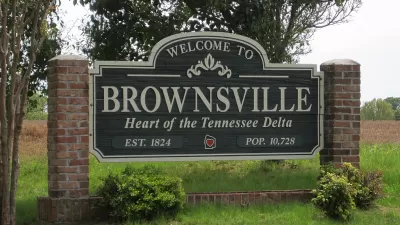In a piece for New Geography, Bill Fulton says that the cool v. uncool debate asks the wrong question. The issue is whether their economy is based on exports or imports.
Sometimes, when a big debate can't be resolved, it's because the wrong question is being asked. Such is the case with the seemingly endless "cool v. uncool" debate about cities. In this excerpt from Romancing The Smokestack, Bill Fulton argues that cities can be prosperous and successful whether they are cool (galleries, lofts, etc.) or uncool (lunchbucket factories). The common factor in all successful cities is -- or at least should be -- that they are based on exporting goods and services, not merely importing money.
A tourist town, retirement community, or bedroom suburb may seem successful on many levels. After all, in every case a lot of people in the city are dropping money locally to keep businesses going -- visitors, retirees, or commuters. But these cities are basically in the business of importing money. Since those spending money are not dependent on the local economy, their affuence is likely to create nothing more than a two-tier economy, with many low-paid workers servicing them.
By contrast, a city that produces goods and services for export is likely to be more consistently prosperous and less likely to be vulnerable to economic ups and downs. The jobs created are likely to be better paying and other companies will spring up as part of the spuply chain. and it doesn't matter what's being exported -- ideas, steel, software, whatever. The common denominator is the export.
Thanks to Bill Fulton
FULL STORY: Cities That Prosper, Cool Or Not

Maui's Vacation Rental Debate Turns Ugly
Verbal attacks, misinformation campaigns and fistfights plague a high-stakes debate to convert thousands of vacation rentals into long-term housing.

Planetizen Federal Action Tracker
A weekly monitor of how Trump’s orders and actions are impacting planners and planning in America.

San Francisco Suspends Traffic Calming Amidst Record Deaths
Citing “a challenging fiscal landscape,” the city will cease the program on the heels of 42 traffic deaths, including 24 pedestrians.

Defunct Pittsburgh Power Plant to Become Residential Tower
A decommissioned steam heat plant will be redeveloped into almost 100 affordable housing units.

Trump Prompts Restructuring of Transportation Research Board in “Unprecedented Overreach”
The TRB has eliminated more than half of its committees including those focused on climate, equity, and cities.

Amtrak Rolls Out New Orleans to Alabama “Mardi Gras” Train
The new service will operate morning and evening departures between Mobile and New Orleans.
Urban Design for Planners 1: Software Tools
This six-course series explores essential urban design concepts using open source software and equips planners with the tools they need to participate fully in the urban design process.
Planning for Universal Design
Learn the tools for implementing Universal Design in planning regulations.
Heyer Gruel & Associates PA
JM Goldson LLC
Custer County Colorado
City of Camden Redevelopment Agency
City of Astoria
Transportation Research & Education Center (TREC) at Portland State University
Jefferson Parish Government
Camden Redevelopment Agency
City of Claremont





























